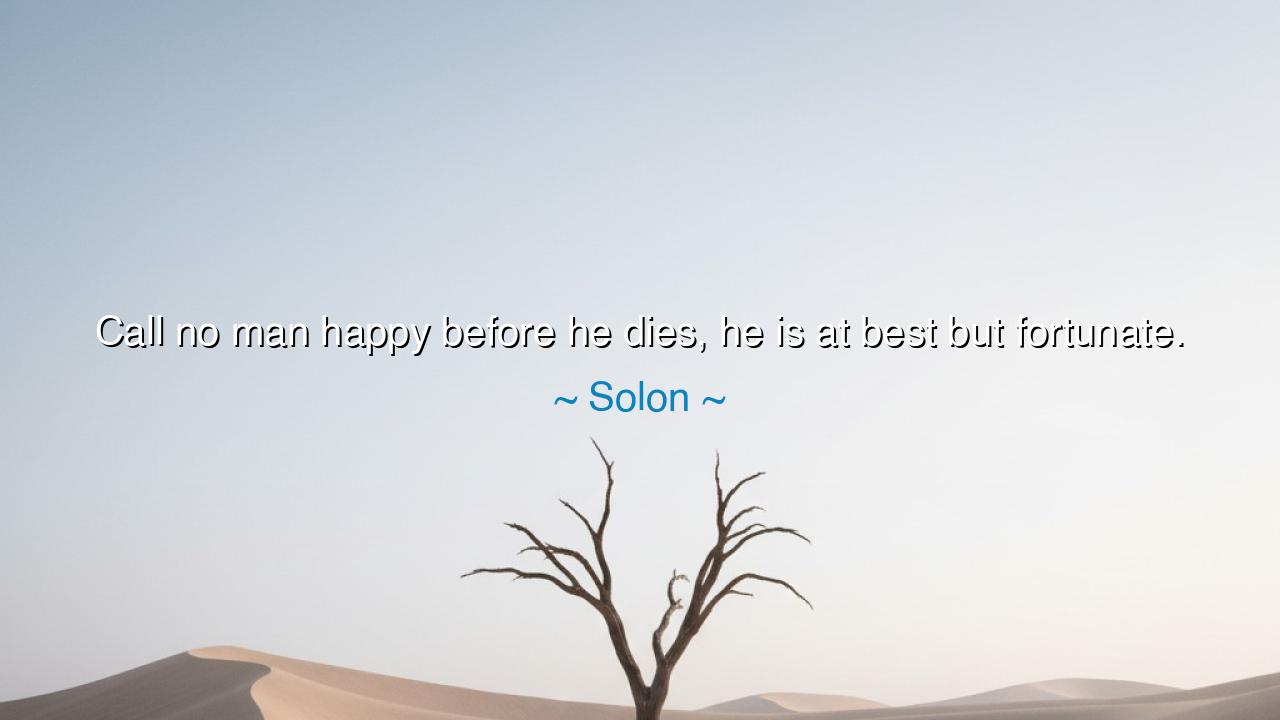
Call no man happy before he dies, he is at best but fortunate.






“Call no man happy before he dies, he is at best but fortunate.” Thus spoke Solon, the wise lawgiver of ancient Athens, whose words carry the weight of centuries and the wisdom of mortality itself. In this saying, he reminds us that happiness — true and enduring happiness — cannot be measured in the fleeting days of a man’s life. Fortune rises and falls like the tide, favoring one man today and abandoning him tomorrow. Until a life is complete, until death seals its story, no mortal may claim to know its true measure. For as long as we draw breath, fate still has the power to turn our joy into sorrow, our triumph into ruin.
The origin of these words lies in a story that has echoed through history. When Croesus, the proud and wealthy king of Lydia, invited Solon to his court, he wished to hear his name exalted. Surrounded by gold, splendor, and power, Croesus asked the Athenian sage, “Who is the happiest of men?” Expecting to hear his own name, Croesus was startled when Solon spoke instead of Tellus of Athens, a simple man who lived honorably, saw his children prosper, and died defending his city. Solon then named others — men of virtue and quiet nobility — but not Croesus. When the king demanded to know why, Solon answered: “Count no man happy until his end is known; for till then, he is not yet beyond the reach of misfortune.”
Croesus, in his vanity, dismissed the philosopher’s warning. Yet the gods would later teach him its truth. Not long after, his kingdom fell to Cyrus the Great, and Croesus, stripped of his wealth and power, was bound upon a pyre to be burned alive. In that moment of despair, he cried out Solon’s name, remembering the wisdom he had once scorned. Cyrus, hearing the tale, was moved by it and spared Croesus’s life. Thus, Solon’s teaching became immortal — a testament to the fragility of human fortune, and to the truth that happiness is not gold or glory, but peace at one’s life’s end.
Solon’s words remind us that life is a journey, not a single moment. The man who seems blessed today may tomorrow be undone by tragedy; the one who suffers now may yet find redemption. Even kings and conquerors, whose names fill the mouths of nations, are powerless before the turning of time. True happiness — the happiness Solon spoke of — is not a mood or possession. It is the harmony of a life lived with virtue, honor, and completion. Only when life’s work is finished, when no reversal can undo its meaning, may one’s happiness be rightly judged.
Consider the life of Socrates, who lived humbly, questioned boldly, and drank the hemlock without fear. Was he happy when condemned by his city? Many would say no. But when his life closed in perfect integrity — when he met death calmly, his soul untouched by bitterness — he achieved the fullness of happiness Solon described. For happiness, in the truest sense, belongs not to the moment but to the whole. It is not measured in comfort, but in character; not in pleasure, but in the peace of a life that ends in wisdom.
Solon’s wisdom speaks, too, to the arrogance of the living. We are quick to envy others — their wealth, their beauty, their seeming ease — but we see only a fragment of their story. The man who smiles today may tomorrow weep in solitude. Therefore, the wise do not judge lives by appearances, nor seek to crown themselves before their time. Instead, they live steadily, humbly, and with gratitude, knowing that fortune is fickle but virtue endures.
So, my child, take this lesson to heart: do not measure your happiness by fleeting joys or passing troubles. Seek instead the contentment that comes from integrity, compassion, and balance. Do not boast in your triumphs, nor despair in your hardships, for the wheel of fate turns for all. Live well, so that when your final day arrives, your life may be called complete — and in that completion, truly happy. For as Solon teaches, happiness is not a gift granted by luck, but a crown bestowed by time upon a life well-lived.
And when the end comes, if you can look upon your days and say, “I lived with purpose, I loved with honesty, I met both joy and sorrow with courage,” then you will have achieved what kings and conquerors could not. Then, and only then, may you be called happy — not in the fragile sense of the living, but in the eternal peace of one whose story is whole.






AAdministratorAdministrator
Welcome, honored guests. Please leave a comment, we will respond soon